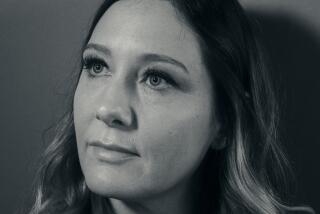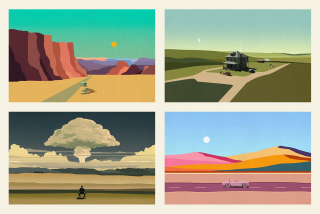VALLEY WEEKEND : MOVIES : Film Combines Love Story and Tale of Chinese in the Old West : ‘Thousand Pieces of Gold’ tells of a young woman of the 1880s who is sold into slavery in the United States.
- Share via
When the film “Thousand Pieces of Gold” was released in 1991, critics went wild. Writing for the Los Angeles Times, Michael Wilmington compared it to “Dances with Wolves” and raved: “Independent in the best sense of the word, ‘Thousand Pieces of Gold’ . . . gives us the Old West through a piece of candle-lit silk, hardship diffused through tears and smoke. ... The movie is a small but genuine triumph. Shot for less than $2 million, it’s a superb Western.”
If you missed this unusual Western the first time around, you have a second chance to see it in a theater this weekend at the Autry. (It’s also available on video.)
Directed by Nancy Kelly, “Thousand Pieces of Gold” tells its fact-based story from the point of view of the ultimate outsider. Its protagonist is Lalu, a beautiful young Chinese woman who is sold into slavery by her desperate father and shipped off to the American West of the 1880s. Lalu ends up in the Idaho mining town of Warren’s Diggens, with no money, no friends, no English.
Given the generic name of “China Polly” (“China Mary” was the other standard option), Lalu works harder than a galley slave. But because of character, luck and the love of a good, if not always sober, man, she manages to avoid being forced into prostitution and ... well, you’ll have to see the movie.
The title doesn’t refer to the amount her father sold her for in hopes of keeping the rest of his starving family alive. Nor is it the sum Lalu needs to buy her freedom (she doesn’t know that slavery is illegal in America until a black cowboy tells her). The phrase is a traditional Chinese term of endearment. Explains director Kelly: “I’d say to you, ‘How’s your thousand pieces of gold?’ and I’d be referring to your daughter.”
Kelly, who will speak at the Saturday screening (the film only will be shown Sunday), said she fell in love with the story when she read the novel of the same name by Ruthanne Lum McCunn. Kelly had made two highly regarded documentaries about the West, suffused with what she had learned as a working ranch hand. But this was her first, and, so far, her only feature.
As Michael Duchemin, curator of history at the Autry, points out, there were almost 100,000 Chinese in the West at the time of the 1890 census. (You can get a taste of what their lives were like by visiting the Autry’s multicultural Spirit of Community exhibit). Mostly poor men who had originally come here to work in the mines and to build the transcontinental railroad, few had the opportunity to raise families. To the immigrants, California was Gold Mountain, and most dreamed of making their fortunes here and then returning to China to live lives of ease and privilege.
During the period of the film, China experienced terrible drought and other natural disasters as well as social upheaval (“sort of like Los Angeles in recent years,” notes Kelly). Desperate poverty at home and a constant demand for Chinese women in the West led to a brisk business in the daughters of the poor. Many ended up in the brothels of San Francisco and smaller towns. Many killed themselves. The movie also reflects the vicious anti-Chinese sentiment that grew throughout the West, sometimes erupting in anti-Chinese pogroms and leading to anti-Chinese legislation in 1882 and 1892.
As played by Rosalind Chao, who went on to star in “The Joy Luck Club,” Lalu is fiercely independent despite her awful predicament. She knows how to use a knife, but she doesn’t really need one: she has a knack for withering her enemies with a look. When the film was released, Chao said she had been obsessed with Chinese-American history since she was a child growing up in Orange County. “We didn’t learn about it in school--there was so little in the textbooks about Chinese immigrants in America--but I would read about it in the library.”
Chao is also expected to speak at the Saturday screening.
But “Thousand Pieces of Gold” isn’t a history lesson. It is, among other things, a love story. Lalu is involved with three men in the course of the film, two very different Chinese-American entrepreneurs and Charlie, a “white demon,” as Lalu calls him. Charlie is played by Chris Cooper, whose credits include John Sayles’ “Matewan” (1987) and the TV miniseries “Lonesome Dove.”
Whether out of curiosity or some other need, Lalu and Charlie are cultural liberals, each clearly fascinated by the Other (Charlie makes use of the town’s acupuncturist, for instance, and Lalu develops a taste for fashionable Western-style clothes). One theme of the film is that, in any era, that complex attraction--call it sexual chemistry, call it love--is a constant counterforce to ethnic hate.
Kelly co-produced the movie with husband Kenji Yamamoto, who also edited it. They were able to piece together funding from the Sundance Institute, the producers of “American Playhouse” and a Hong Kong company.
Independent filmmaking is a grinding experience, Kelly says, “but the great thing is once you get your film financed, you have the chance to put a vision up there on the screen. There is a trust in the director’s vision and the writer’s vision, and you just don’t get messed with.”
Kelly and Yamamoto took their movie from one film festival to another and finally found a theatrical distributor in Las Vegas-based Greycat Films, whose “Henry: Portrait of a Serial Killer” (1990) had been a surprise hit.
The couple, whose Mother Lode Productions is based in Marin County, are now trying to get a contemporary Western called “The Sweet Wide Open” onto the screen. They have a script. They have commitments from Edward James Olmos and other actors with name recognition. Now all they need is the money.
DETAILS
WHAT: Screenings of the film “Thousand Pieces of Gold” in the Wells Fargo Theater at the Autry Museum of Western Heritage. The film is rated PG-13.
WHERE: 4700 Western Heritage Way, Griffith Park, across from the Los Angeles Zoo.
WHEN: 2 p.m. Saturday and Sunday. The special program, with speakers, is Saturday only.
HOW MUCH: $5 for the special program. Admission for the Sunday screening is $3 for adults, $2 for children and seniors, and $1 with museum admission, which is $7.50 for adults, $5 for seniors and students with I.D., $3 for children ages 2 through 12.
FYI: (213) 667-2000.
More to Read
Only good movies
Get the Indie Focus newsletter, Mark Olsen's weekly guide to the world of cinema.
You may occasionally receive promotional content from the Los Angeles Times.










